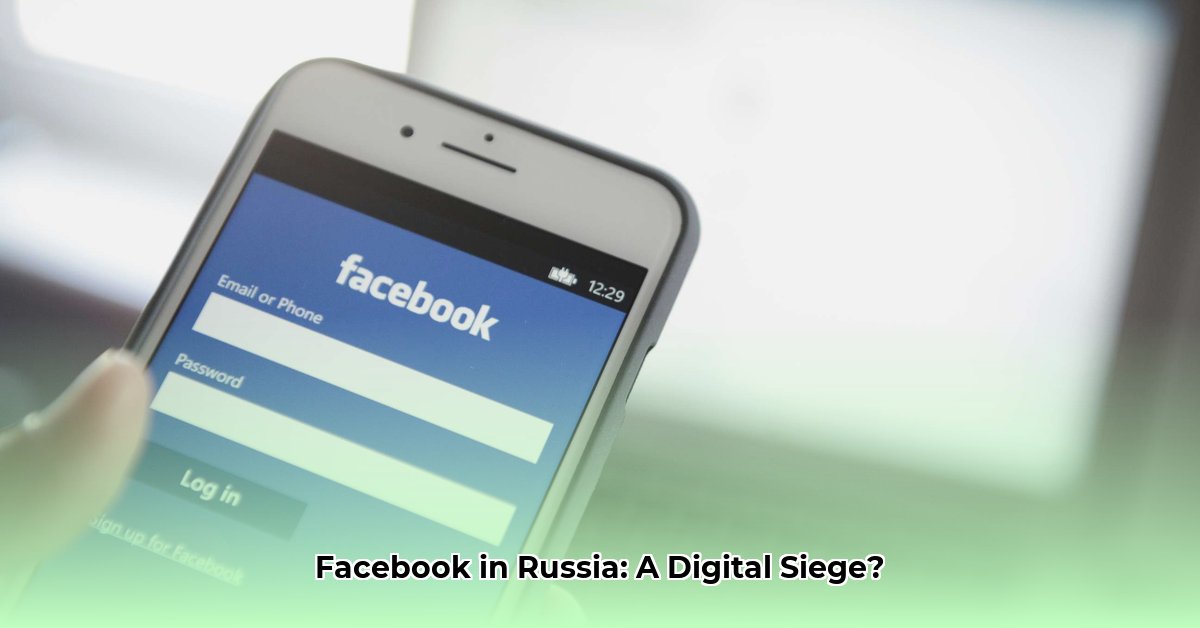
Russia's blocking of Facebook in 2022 wasn't an isolated incident; it was a strategic move reflecting the Kremlin's increasing control over information within the country. This article examines the reasons behind the ban, its impact on Russian citizens, and the various methods people employ to circumvent it. We'll analyze the geopolitical implications and explore the evolving technological arms race between censorship and circumvention.
The Rationale Behind the Block
The Russian media regulator, Roskomnadzor, officially cited violations of a new "fake news" law as justification for blocking Facebook. However, the timing—coinciding with the ongoing conflict in Ukraine—suggests a deeper motive. Many experts believe the ban serves primarily to control the narrative surrounding the war and suppress dissenting voices. This is a continuation of the Kremlin’s long-standing efforts to manage information flow within its borders. But did this strategy achieve its intended goals?
How effective is information control in the digital age? The effectiveness of Russia's information control strategy is a subject of ongoing debate. While the ban limits access to one major platform, it also pushes users towards other, potentially less regulated spaces.
The Ripple Effects: Global Implications
The Facebook ban has ramifications extending far beyond Russia. It challenges established norms of internet freedom and sets a worrying precedent for other authoritarian regimes. The potential for global internet fragmentation, with different countries operating under vastly different digital rules, is a serious concern. This digital divide raises significant issues regarding access to information and the global spread of misinformation.
What are the potential consequences of a fragmented internet? This is a critical question with significant implications for international relations and the future of the internet itself.
Life Under the Digital Curtain: The Russian Experience
For ordinary Russians, the ban has drastically altered their digital lives. Many rely on virtual private networks (VPNs) (digital tools masking your location) to access Facebook, creating a digital divide where information access becomes a privilege rather than a right. This exacerbates existing socioeconomic inequalities and restricts access to diverse perspectives.
What are the long-term social and economic impacts of restricted internet access? Research is actively being undertaken to assess the full impact of this digital divide on Russian society.
The Innovation Response: A Technological Arms Race
The ban has spurred innovation in circumvention techniques. Russians are increasingly utilizing alternative platforms, messaging apps, and more secure communication channels. However, these alternatives often lack Facebook's safety measures, creating potential problems for misinformation and harmful content. This highlights the ongoing technological arms race between censorship and attempts to circumvent it.
Is this a genuine victory for the Kremlin, or a mere reshuffling of the information battlefield? The answer is likely multifaceted, combining both strategic gains and unintended consequences.
International Responses: A Mixed Bag
The ban drew widespread condemnation from Western governments, who emphasized the importance of free speech. However, devising effective responses has been challenging. While existing sanctions against Russian tech companies remain, their long-term impact on information control remains a subject of debate. Some experts suggest that more aggressive sanctions could even backfire.
What are the most effective strategies for responding to digital authoritarianism? This is a complex issue with no easy answers, demanding careful consideration of potential unintended consequences.
The Uncertain Future: A Shifting Landscape
The long-term effects of Russia's Facebook ban remain uncertain. While the immediate impact is clear, its lasting influence on the Kremlin's credibility and the stability of the Russian information landscape is still unfolding. It's clear, however, that this bold move has fundamentally altered the digital landscape, triggering a broader discourse on internet freedom and information control.
Three Pivotal Points:
- The Facebook ban is part of a broader Kremlin strategy to control information and suppress dissent.
- The ban has created a digital divide in Russia, exacerbating existing socioeconomic inequalities.
- The international response has been mixed, highlighting the complexities of confronting digital authoritarianism.
Actionable Steps to Access Facebook in Russia (with associated risks):
- Use a reputable paid VPN: This remains the most effective method, but Russia actively works to block VPNs. (Success rate: variable, dependent on VPN provider and Russian countermeasures; effectiveness generally high with premium VPNs).
- Explore alternative networks (Tor): Anonymizing networks like Tor offer enhanced security but at the cost of speed. (Success rate: Moderately high, but slower speeds and potential for detection).
- Modify DNS settings: A simpler, less effective method for bypassing basic blocks. (Success rate: low, easily detected).
Disclaimer: Circumventing government restrictions carries legal risks within Russia. Users should carefully assess the potential consequences before attempting to access blocked content.